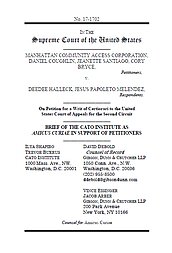Learn more about Cato’s Amicus Briefs Program.
A robust system of free expression requires at least two things. First, strong protections for free speech in the public sphere, including protections against viewpoint discrimination, content restrictions, and other forms of censorship. Second, strong protections for private actors to speak, not speak, or to censor speech that does not comport with their views or values when that speech is performed on private property. The First Amendment protects people from government action, but it rightly can’t be used against, say, Walmart or the NFL. By limiting the First Amendment to government actors, we maintain a broad ecology of free expression where individuals aren’t subject to constitutional liability because they choose to use their property to promote ideas that conform with their values.
The difficult question, however, is when someone is a “state actor” for the purposes of the First Amendment. This case centers around whether a public-access TV channel run by private nonprofit corporation is subject to the First Amendment. The Manhattan Neighborhood Network (MNN) was designated in 1991 to operate a public-access channel in New York City. The Manhattan Borough President has no control over MNN and chooses only two of the thirteen members of the board of directors. Jesus Melendez was a sometime contributor to the network who was suspended in 2012 for harassing an employee. He later produced a video that included harassing and threatening language toward MNN and the staff. In response, MNN banned the video from further airings as a violation of the network’s zero tolerance policy for harassment. Melendez and his associate DeeDee Halleck brought a First Amendment claim against MNN, but the initial question was whether the network is a state actor for the purposes of the First Amendment. The district court said no, noting that, while it was a close call, other circuits had concluded that privately run public-access networks were not state actors. The Supreme Court hasn’t yet weighed in on the question directly, but Justice Anthony Kennedy, in a 1996 concurrence in a case dealing with laws regulating content on public-access channels, wrote that they should be considered state actors who run public fora and are thus subject to the First Amendment. In his concurrence in the same case, Justice Clarence Thomas disagreed, writing that “franchising authorities require cable operators to create public access channels, but nothing in the record suggests that local franchising authorities take any formal easement or other property interest in those channels that would permit the government to designate that property as a public forum.”
The Second Circuit agreed with Justice Kennedy, holding that MNN was a state actor, but in so doing it failed to properly apply the Supreme Court’s state-actor tests. As the dissent pointed out, it hadn’t been shown that “MNN is ‘controlled’ or ‘compelled’ by the state,” or that two members of a thirteen-person board of directors was enough for “joint action” between the state and a private entity. As for whether MNN performs a “public function,” the dissent rightly observed that “the ownership and operation of an entertainment facility are not powers traditionally exclusively reserved to the State, nor are they functions of sovereignty,” adding that “it is fortunate for our liberty that it is not at all a near exclusive function of the state to provide the forums for public expression, politics, information, or entertainment.”
Cato has filed an amicus brief supporting MNN’s petition for Supreme Court review. While it’s possible that some public-access channels could be rightly called state actors, the Court should take the case to clarify the state-actor test and to review the Second Circuit’s unnecessarily broad opinion. Public-access channels may be set aside for access by the public, but the Supreme Court has generally required the added showing that it is operated by the government or that there’s a sufficient connection to the government. That is not the case for MNN. Moreover, such a holding could be dangerous for other businesses, such as Internet service providers, who often have specifically sought to partner with municipalities to provide communities with access to the Internet. Over the past few decades, lawsuits have been brought arguing that AOL, YouTube, and even search engines are state actors. Those challenges rightly failed, but the Second Circuit’s opinion could make it easier to bring, and win, similar cases in the future. Ultimately, clarifying the lines between the government and private actors helps create a more vigorous system of free expression.
